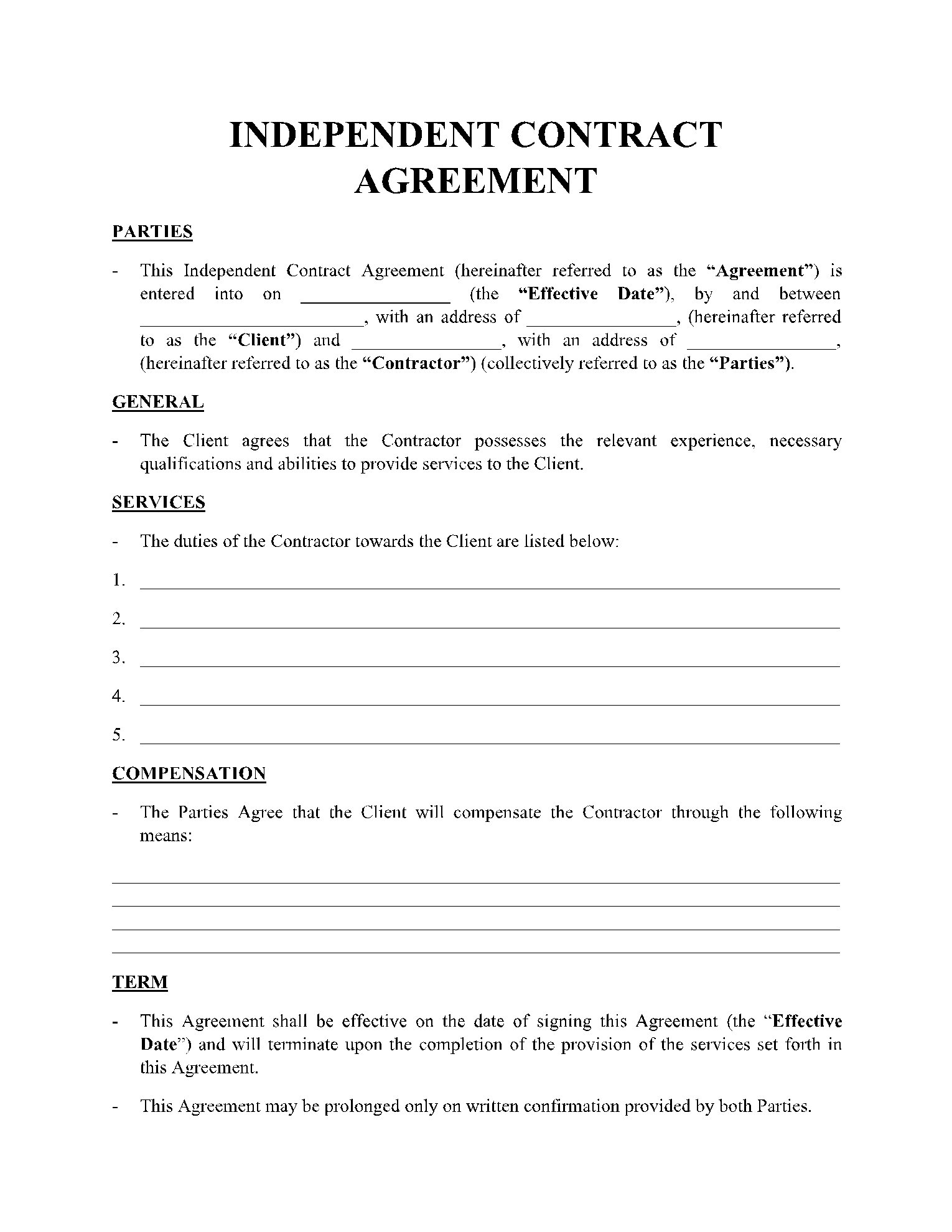An independent contractor is an individual who offers services to other people or business owners in exchange for money. It is usually recommended that there should be a legally binding agreement between two parties going into a contract. An independent contractor agreement is usually used at the inception of a business or contractual relationship between a contractor and a hiring party.
Here is a breakdown of what an independent contractor agreement is, what it does, essential components of an independent contractor agreement template, among others. Read on to know about an independent contractor contract.
What Is an Independent Contractor Agreement and What Does It Do?
An Independent contractor agreement is a written contract between two parties - a client paying for service and a contractor delivering the service. This contractor contract states specifically the terms of the agreement such as the description of the services to be rendered by the contractor, the time frame between which the project is expected to be completed, the payment charges and how it will be made. It is a document that offers legal protection for both parties during the course of the project and even includes certain confidentiality and resolution clauses.
An independent contractor agreement, also referred to as a 1009 agreement, differs from an employment agreement in the sense it clearly states that the hired party is not an employee and therefore doesn’t come under certain legal obligations.
The independent contractor agreement performs the following functions:
- It describes the service to be delivered
- It states specifically the terms of the service as well as the expected completion period
- It describes the amount to be paid, and who is responsible for certain expenses incurred during the project
- It states the confidentiality and dispute resolution clauses
- It binds and protects the parties involved in the contract
Key Considerations in Using an Independent Contractor Agreement
If you ever find yourself in need of a simple independent contractor agreement, there are certain things you need to consider, such as:
Contract relationship: Your terms of agreement must state that the party is an independent contractor and therefore is not entitled to employee benefits. Also, that the contractor is responsible for handling their own taxes.
Scope of Contract: To avoid disputes, you should consider stating out the specific requirements of the project, and what you’re expecting the contractor to deliver.
Contract Timeline: Your contractor agreement should state clearly when the work is expected completion date. In case there are milestones, the agreement should state the deadline for each milestone. You should also think of any unforeseen situations that might delay the project and take those into considerations when setting the timeline.
Payment Conditions: Your contract agreement should state the conditions for paying the contractors. For instance, the contractor agreement could adopt an EOM which means that the contractor will be paid at month’s end, or rather that the contractor will be paid after completing each milestone.
There are other things to consider such as contractor’s and client’s obligations, confidential secrets, intellectual properties, termination conditions, and dispute resolution terms, etc. All of these should be well covered in a simple independent contractor agreement free obtainable online.
Benefits of an independent contractor agreement
Apart from absolving both parties of certain responsibilities, here are the benefits associated with an independent contractor agreement:
- It ensures that the contractor is legally bound to the terms of the contract, and not at any point could he or she breach the contract without any just consequences.
- It allows both parties to know the burdens which they are legally responsible to bear during the period of the project.
- The agreement states specifically what is expected from both parties and as such prevent any probable disputes.
- The agreement serves as a legally defensible document that protects the rights of each party during the course of the contract
- In case of disputes or disagreements, an independent contractor agreement is a legal document that states what actions should be taken to address the issues.
- The agreement serves as a show of faith that both parties are mutually invested in seeing the contract to completion.
- It helps to ensure a smooth and successful relationship between the client and the contractor
What to Include in an Independent Contractor Agreement?
There are certain elements that must be included in the agreement without which there will be loopholes in it. Although the clauses and components of the agreement vary from project to project, there are common elements which must be included in all standard independent contractor agreements. They are:
The client: This includes the name and other relevant details of the individual or company who is hiring the contractor and therefore responsible to meet the contract’s obligations such as payment
Contractor: The agreement should state the name and other relevant details of the contractor who is offering the services
Services: The agreement should state specifically the service the contractor will provide for the client
Remuneration: This is the compensation or the amount of money that both parties agreed upon which is to be paid to the contractor in exchange for their services
Timeline: The agreement should include the period when the contractor is expected to complete the project. In case of milestones, this part of the agreement must include that.
Termination: The conditions under which the contract could be terminated should be included in the agreement.
A contractor contract template would usually contain most of these sections. You can download free copies of your independent contractor agreement template online on platforms like CocoDoc.
